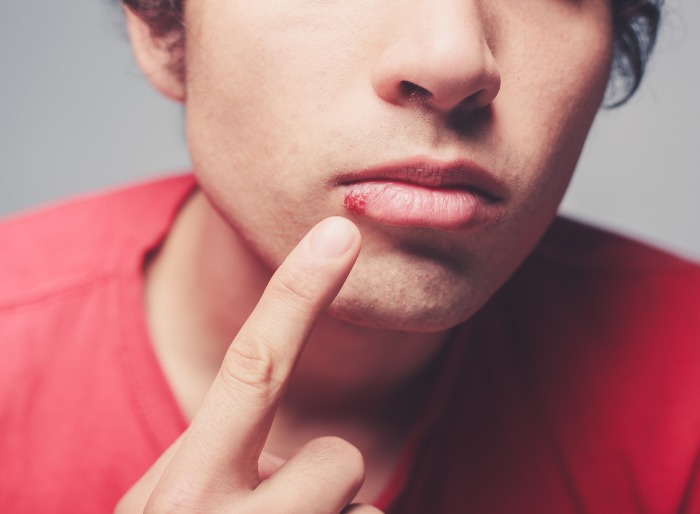If you have ever had a fever blister, more commonly known as a cold sore, you have picked up the herpes simplex virus. There is no cure for herpes simplex, but many sores often clear without treatment. Our Gainesville dermatologists at Dermatology Associates have years of experience in diagnosing and treating outbreaks of herpes simplex.
Dermatology Associates is a full-service dermatology practice providing the Gainesville community with the highest quality of cosmetic and medical dermatology services with innovative techniques, consultative support, and state-of-the-art equipment.

What Is Herpes Simplex?
Herpes simplex, commonly referred to as cold sores or fever blisters, is a form of viral infection, often affecting many people on one or more occasions in their life. There are two types of the herpes simplex virus, including HSV-1, which primarily causes oral herpes, and HSV-2, which causes genital herpes.
What Causes Herpes Simplex?
Often caused by one of two types of the virus, herpes simplex can affect almost any skin area. After it first appears, the virus will remain latent, only to recur down the line. During its recurrence, the virus will multiply, causing clinical blister-like lesions.
Who Gets Herpes Simplex?
Herpes Simplex can occur in people of all ages, but primary attacks of HSV-1 mainly occur in infants and children, while HSV-2 mainly occurs after puberty and is transmitted sexually. HSV is transmitted when someone comes in direct or indirect contact with someone with active herpes simplex, which is contagious for 7-12 days, while incubation takes 2-12 days. Occasionally, minor injuries can lead to HSV infecting the skin, such as an infant sucking their thumb and transmitting HSV from mouth to thumb.
What Are The Clinical Features Of Herpes Simplex?
Primary Herpes Simplex
While the primary infection of each HSV strain can be mild, symptomatic infections are typically more severe than recurrences, with HSV-2 being more symptomatic. In children between 1–5 years of age, HSV-1 often presents as gingivostomatitis. Symptoms often include the following.
- Fever
- Restlessness
- Excessive Drooling
- Pain While Eating & Drinking
- Foul Breath
- Swollen And Painful Gums
- Enlarged Lymph Nodes
- Yellow Ulcers On The Tongue, Throat, Palate, & Cheeks
Primary HSV-2 often presents as genital herpes after sexual activity with the following symptoms.
- Painful Vesicles
- Ulcers
- Redness & Swelling Lasting 2–3 weeks
- If Left Untreated, It Can Cause Lymphadenopathy.
Recurrent Herpes Simplex
Following the primary infection, clinical manifestations may not occur again. However, recurrent infections are common, especially with HSV-2. Both of these strains can appear anywhere on the body, and the area may itch or burn, followed by a cluster of umbilicated vesicles. These clusters often appear in a line, similar to shingles. The following can trigger recurrences.
- Minor Trauma, Surgery, Or Procedures To The Affected Area
- Upper Respiratory Tract Infections
- Sun Exposure
- Hormonal Factors
- Emotional Stress
How Is Herpes Simplex Diagnosed?
Your dermatologist in Gainesville, FL, can usually diagnose herpes simplex by carefully examining the herpes sores, but if there is a clinical doubt, they may conduct a PCR test of a viral swab taken from fresh vesicles.
What Are The Complications Of Herpes Simplex?
Eye Infection
Herpes simplex can cause swollen eyelids and conjunctivitis, along with opacity and ulceration of the cornea.
Eczema Herpeticum
If you have a history of atopic dermatitis or Darier disease, HSV can cause a severe, widespread infection called eczema herpeticum. This presents with numerous blisters, often on the face, along with swollen lymph nodes and fever.
Erythema Multiforme
Erythema Multiforme is an uncommon complication of herpes simplex or other infections and presents as symmetrical plaques on hands, forearms, feet, and lower legs, often accompanied by target and mucosal lesions.
What Is The Treatment For Herpes Simplex
How severe the infection also affects the treatment of herpes simplex. Mild eruptions of herpes simplex require no treatment, and blisters can often be covered with hydrocolloid patches. But, if the infection is more severe, it may require an antiviral agent, such as valacyclovir. Topical antiviral ointments can help to shorten attacks or recurrent herpes simplex if started early enough.

Can Herpes Simplex Be Prevented?
A common trigger for facial herpes simplex is sun exposure, making sun protection with a high protection factor crucial for prevention. Antiviral drugs can help prevent HSV from multiplying but cannot eradicate the virus from its resting stage within the nerve cells. However, medications available can help prevent and shorten frequent attacks.